

eSafety FOI 24101
Document 1/13
From:
International
Sent:
Friday, 30 September 2022 11:56 AM
To:
s 22
Subject:
Action in the United States – ISF Roundup September 2022 [SEC=OFFICIAL]
International, Strategy and Futures Roundup
15 - 28 September 2022
Catch up on the latest global online safety developments in the International, Strategy and
Futures fortnightly newsletter. Please note, article selections are not endorsement.
Action in the United States
California passes social media transparency bill
On 13 September 2022, the Governor of California, Gavin Newsom, approved Bill B-587
Social media companies: terms of service. In February 2021, Assemblymember Jesse
Gabriel introduced the bil with the aim of ‘pulling back the curtain and require tech
companies to provide meaningful transparency.’ Social media companies that earn more
than US$100 million per year will have to publish content moderation policies and report
information such as data on violations of terms of service to the Attorney-General. They
will also have to publish this information online.
Texas and Florida look to the Supreme Court
1
A legal battle is unfolding over a Texas law that stops large social media platforms from
removing political posts. The law makes it possible for individuals or the Texas Attorney
General to sue social media platforms with more than 50 million monthly US users for
taking down political viewpoints. A coalition of tech companies is contesting the law,
arguing that it undermines their discretion to moderate dangerous or illegal content on
their platforms. Despite the Appeals Court ruling to uphold the law, it is yet take effect and
analysts expect a Supreme Court appeal from tech groups is likely.
In Florida, the Attorney General asked the Supreme Court to review Senate Bill 7072,
which aims to stop social media companies from moderating users’ political speech. While
an Appeals Court upheld the Texas law, it determined it is unconstitutional for Florida to
prevent social media companies from issuing bans to political figures under that state's
law. The Washington Post explores the implications of these Appeals Court rulings and a
potential Supreme Court review.
Social media companies testify before US Senate Committee on trust and safety
Executives from Meta, TikTok, YouTube and Twitter appeared before the Senate
Homeland Security Committee to respond to questions on safety, privacy and moderation.
Senators asked questions about the number of employees working on trust and safety,
moderation efforts on non-English language content, and data privacy breaches.
Following its appearance before the Committee, YouTube announced an updated content
moderation policy that aims to curb violent extremist content, including content not
affiliated with designated terrorist organisations.
Senators call for a new US tech regulator
Republican Senator Lindsey Graham and Democrat Senator Elizabeth Warren are
developing a proposal to regulate the US tech sector, with an enforcement regime akin to
that of the European Union. Graham claims existing regulatory bodies have not kept pace
with technology.
2

International bulletin
New software to understand algorithms under Christchurch Call
Prime Minister of New Zealand, Jacinda Ardern, announced a joint initiative with the US,
Twitter and Microsoft to develop new software tools to research how algorithms drive
individuals towards terrorist and violent content. The announcement coincided with the
Christchurch Call Leaders’ Summit, which brought together governments, online service
providers and civil society to discuss their continued efforts to combat terrorist and violent
extremist content online.
Expert Group backs complaints mechanism for online harms in Ireland
Irish Minister for Tourism, Culture, Arts, Gaeltacht, Sport and Media, Catherine Martin,
published the Report of the Expert Group convened to examine the practicability of
including an individual complaints mechanism in the Online Safety and Media Regulation
Bill 2022. The Group recommended the Irish Government introduce an individual
complaints mechanism on a phased basis, prioritising those complaints where the online
content in question relates to children.
3

Industry updates
Apple News hack
Fast Company, which provides content for Apple News’ subscription service was ‘hacked’
resulting in offensive two-sentence push notifications being sent to some iPhone users
including some who were not subscribers. Traditionally known for its ‘walled garden’, the
hack was remedied by Apple, which disabled Fast Company’s channel to prevent further
offensive alerts going out to its customers.
Roblox rolls out voice chat and age recommendations
Popular online game platform Roblox, which relies on user-generated content, is rolling
out voice chat for users aged 13 and over. Announced at a recent developer conference,
the new voice chat allows users who verify their age to have reduced chat filters to
communicate more freely with other players. For players under 13, Roblox will maintain its
text only chat functionality.
Parler’s ‘uncancellable cloud’
Parler announced it is restructuring with a new venture called Parlement Technologies.
Marketing itself as ‘a free speech social media platform’ and an alternative to ‘mainstream
platforms like Facebook and Twitter’, the company will now provide cloud infrastructure for
businesses ‘at risk of being forced off the internet’.
TikTok’s approach to content moderation
Forbes reports that TikTok used a ‘two-tiered system’ and ‘more lenient policy
enforcement system’ to give preferential treatment to influencers and celebrities. Forbes
says TikTok used dedicated queues to ‘prioritize and protect the posts of people with more
than 5 million followers when they break TikTok’s content rules’. According to Engadget,
TikTok was using this moderation system as recently as last year.
4

Twitch's design allegedly enabling abusers to track children
Bloomberg reports that Amazon's livestreaming service Twitch has moderation tools that
have proved insufficient at preventing young children from livestreaming themselves and
being groomed by adults. There are few barriers to prevent children livestreaming and
adult viewers can communicate through text anonymously with children. Twitch relies on
user reports and automated solutions to identify abuse, but many grooming tactics are
designed to escape automated detection.
Instagram’s suicide and self-harm policies
At a UK inquest into the suicide of 14-year-old Molly Russell, Elizabeth Lagone (Meta
Head of Health and Well-Being Policy) said Meta’s guidelines on suicide and self-harm
were subsequently updated in consultation with experts. Meta changed its guidelines to
ban ‘all graphic suicide and self-harm content’ while allowing users to talk about their
feelings related to those issues providing those comments are not ‘graphic, promotional,
or show methods or materials’.
YouTube
Bloomberg details how YouTube algorithms went from relying on machines alone to more
actively involving humans, particularly on YouTube Kids. Mark Bergen’s Like, Comment,
Subscribe: Inside YouTube’s Chaotic Rise to World Domination suggests many women
creators on the YouTube platform are dealing with ‘vicious harassment, bullying, and
stalking’ with ‘toxicity on the platform’ escalating, despite harassment policies being
updated in 2019.
Emerging issues
Calls to regulate facial technology
5
The Human Rights Law Centre (HRLC) welcomed a University of Technology Sydney
report on facial recognition technology (FRT), which proposes a legal framework for
regulating the use of FRT. The HRLC called on the Attorney-General to urgently regulate
the technology to prevent human rights harms. The proposed legal framework would
require developers and deployers of FRT – including, in some cases, age assurance tools
that rely on facial analysis – to undertake impact assessments, provide safeguards and
oversight mechanisms and prohibit use in high-risk contexts. Kieran Pender, Senior
Lawyer for the HRLC says ‘Our current laws were not drafted to address the challenges
posed by facial recognition technology’ and it ‘has the potential to disproportionately
impact women and people of colour’, as well as marginalised communities.
Social media users evade content moderation using coded ‘algospeak’
Social media users are increasingly using ‘algospeak’ (codewords, emojis, and deliberate
typos) to circumvent automated content moderation tools. The machine learning tools
employed by platforms can detect overtly violative material, like hate speech, but struggle
with euphemisms like ‘camping (abortion)’ or ‘cheese pizza (CSEM)’.
Report shows increase in calls for violence on ‘Incel’ forum
The Centre for Countering Digital Hate (CCDH) released a report on the ‘Incelosphere’, a
reference to forums that host discussions of the ‘involuntary celibate’ movement, which
promotes hatred and violence against women and other groups. Studying posts on one
‘incel forum’, CCDH found a 59 percent increase between January 2021 and January
2022 in the use of terms and codewords related to acts of mass violence.
Research
Distinguishing deepfakes from reality
In the Journal of Online Trust & Safety, the article Creating, Using, Misusing, and
Detecting Deep Fakes forecasts that deepfakes will become indistinguishable for humans,
and outlines technologies available to detect deepfakes.
Algorithm audits
The University of Zurich’s empirical investigation into the TikTok recommender algorithm
found that the active choice of ‘following’ another user had the largest influence on the
algorithm. Researchers were concerned that video view rate had a similar level of
influence as ‘liking’ a video. As videos cannot be ‘unwatched’, this limits the control a user
has over the feed.
Mozilla released research into YouTube’s algorithm, finding that user controls like clicking
‘dislike’ or ‘not interested’ had little effect on which videos the platform would recommend.
Similar to TikTok, this research raises concerns about users’ ability to protect themselves
from harmful or problematic content.
6

Report advocates for Safety by Design to protect children in virtual reality
In a report exploring the risks to children emerging on immersive social and gaming
platforms, the Bracket Foundation encourages tech companies and government to
prioritise ‘Safety by Design’ when designing and regulating virtual reality. The report
highlights a range of safety solutions including age assurance and AI-supported
moderation. It concludes that comprehensive regulatory frameworks are needed to
standardise safety measures.
Unsubscribe
7
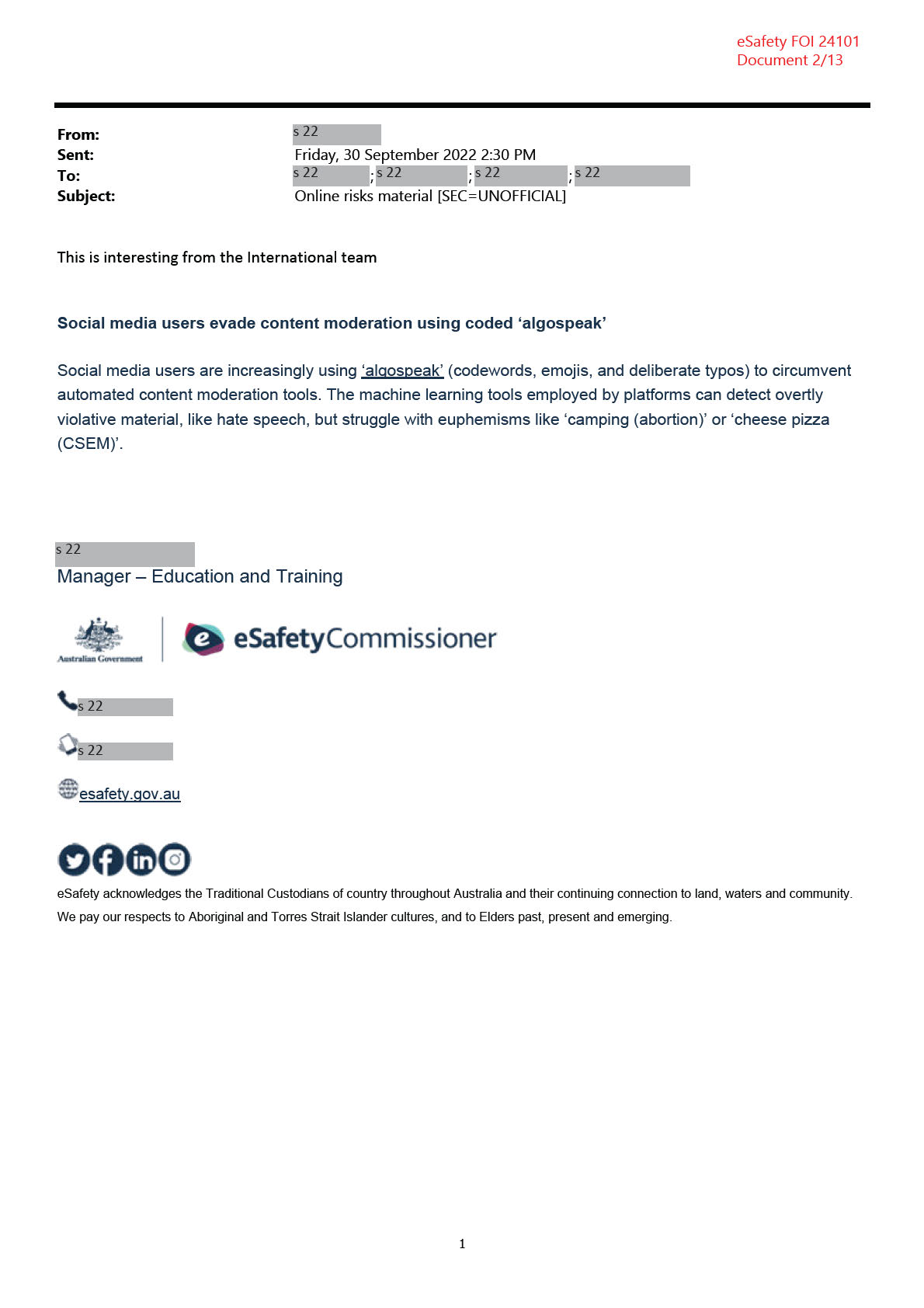
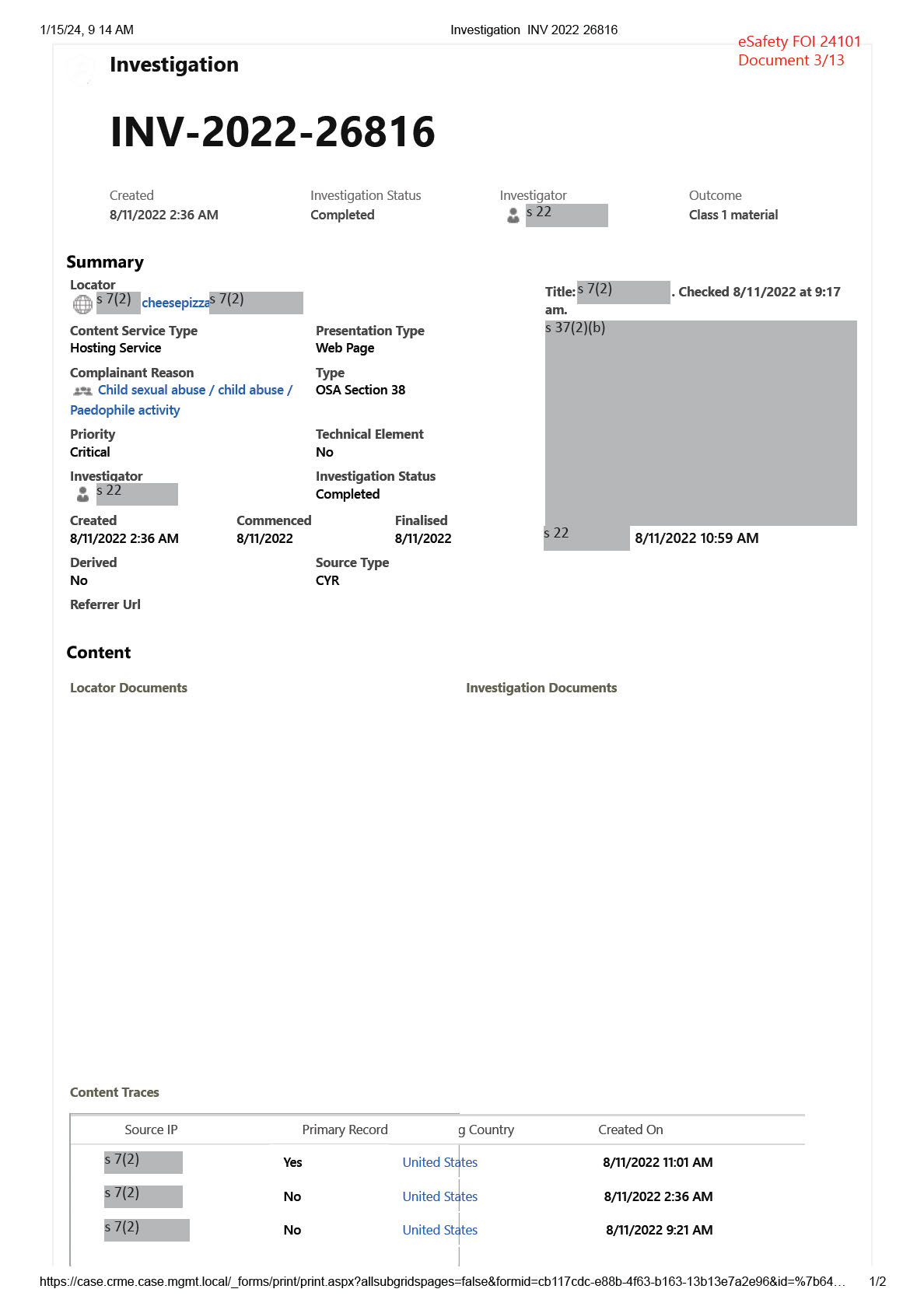
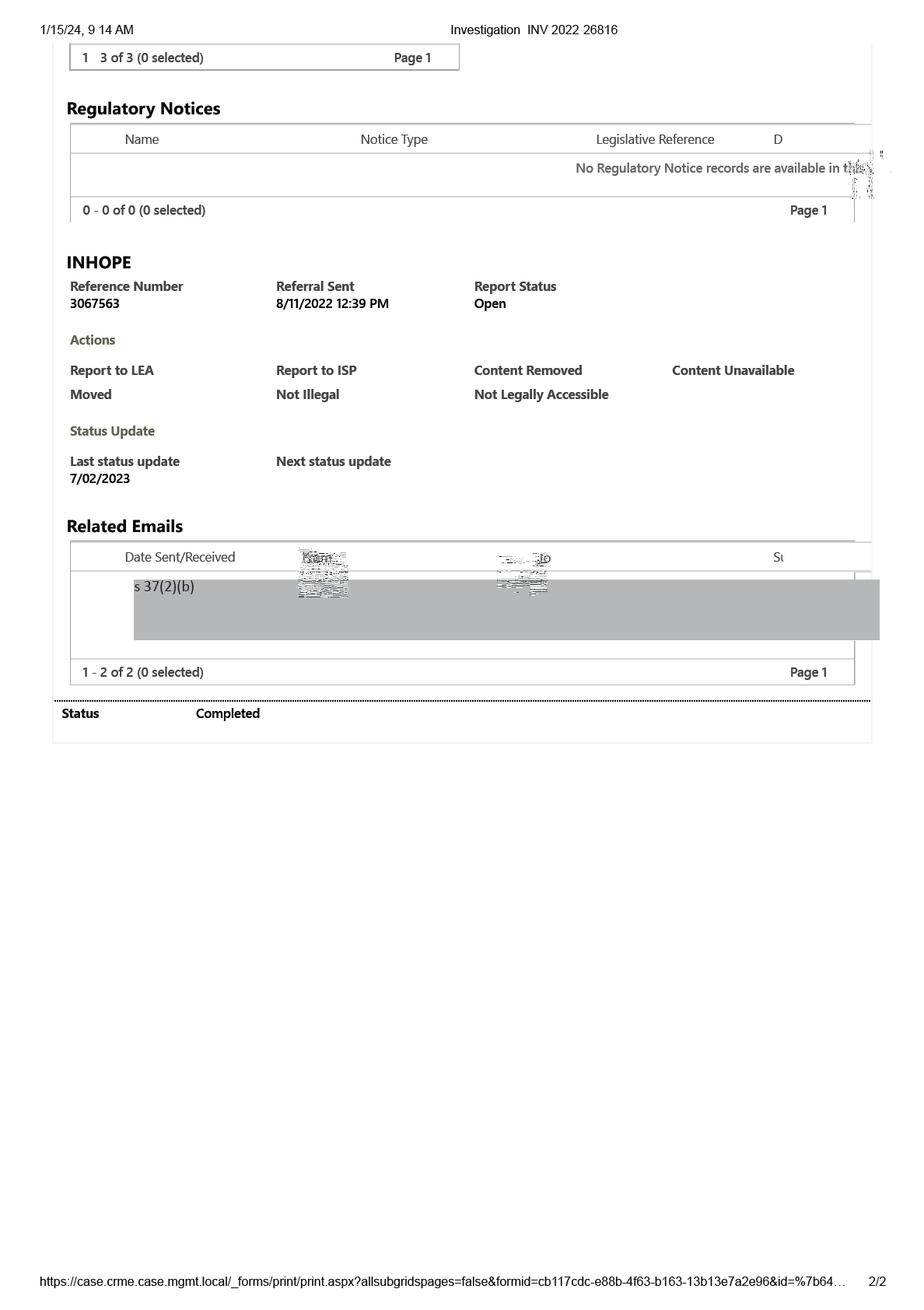






1/15/24, 9 13 AM
Investigation INV 2023 02104
eSafety FOI 24101
Investigation
Document 6/13
INV-2023-02104
Created
Investigation Status
Investigator
Outcome
24/01/2023 10:24 AM
Terminated
s 22
Summary
Locator
Title:
s 7(2)
cheesepizzas 7(2)
Locator updated to directed URL.
Content Service Type
Presentation Type
s 22
25/01/2023 10:10 AM
Hosting Service
Web Page
Complainant Reason
Type
Child sexual abuse / child abuse /
OSA Section 38
Paedophile activity
Priority
Technical Element
Low
No
Investigator
Investigation Status
s 22
Terminated
Created
Commenced
Finalised
24/01/2023 10:24 AM
25/01/2023
25/01/2023
Derived
Source Type
No
CYR
Referrer Url
Content
https://case.crme.case.mgmt.local/_forms/print/print.aspx?allsubgridspages=false&formid=cb117cdc-e88b-4f63-b163-13b13e7a2e96&id=%7b20…
1/3
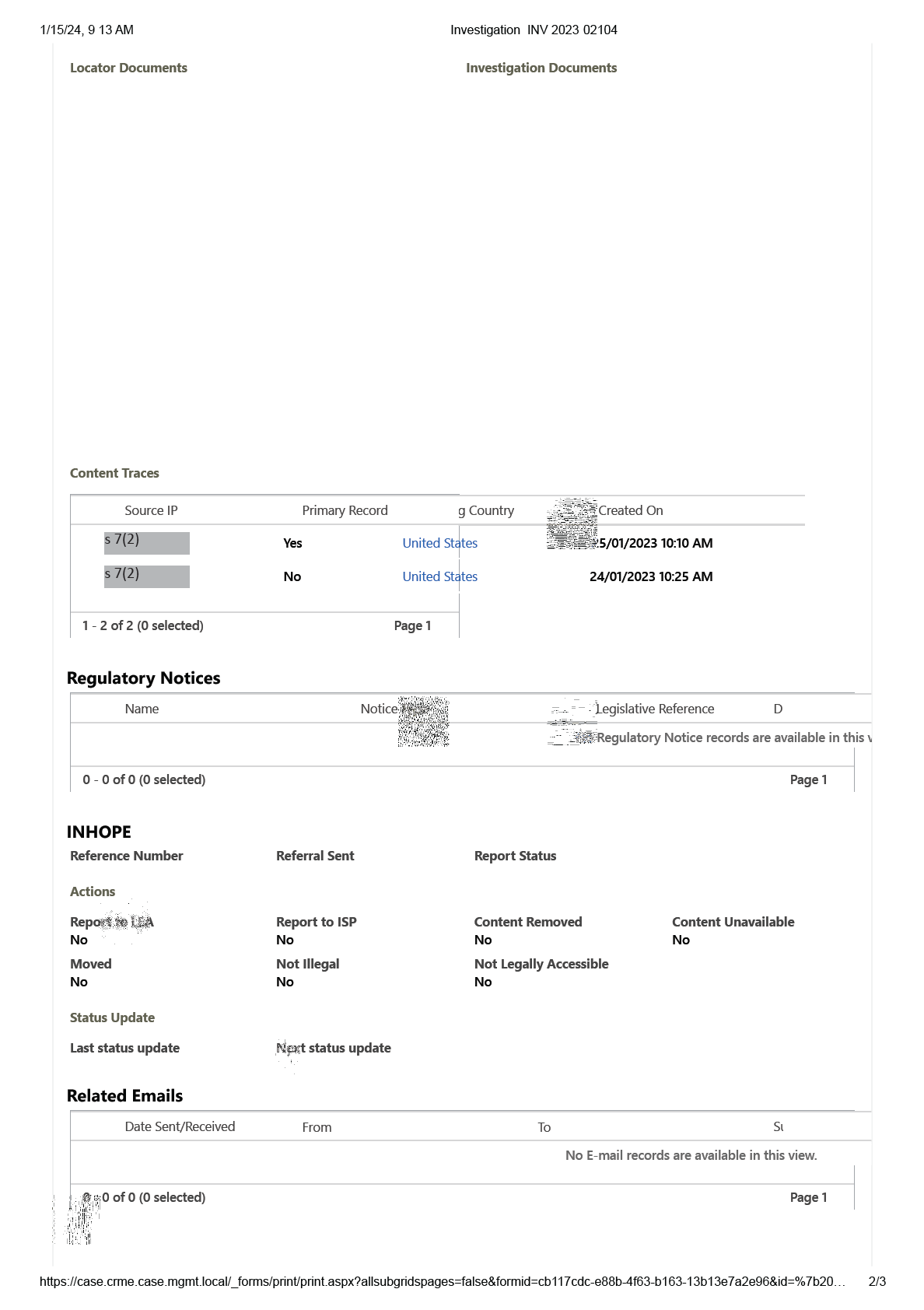
1/15/24, 9 13 AM
Investigation INV 2023 02104
Status
Terminated
https://case.crme.case.mgmt.local/_forms/print/print.aspx?allsubgridspages=false&formid=cb117cdc-e88b-4f63-b163-13b13e7a2e96&id=%7b20…
3/3





1/15/24, 9 12 AM
Investigation INV 2023 02378
eSafety FOI 24101
Investigation
Document 7/13
INV-2023-02378
Created
Investigation Status
Investigator
Outcome
28/01/2023 4:20 AM
Completed
s 22
Class 1 material
Summary
Locator
Title:
s 7(2)
cheesepizzas 7(
s 37(2)(b)
Content Service Type
Presentation Type
Hosting Service
Web Page
s 22
30/01/2023 2:56 PM
Complainant Reason
Type
Child sexual abuse / child abuse /
OSA Section 38
Paedophile activity
Priority
Technical Element
Critical
No
Investigator
Investigation Status
s 22
Completed
Created
Commenced
Finalised
28/01/2023 4:20 AM
30/01/2023
30/01/2023
Derived
Source Type
No
CYR
Referrer Url
Content
https://case.crme.case.mgmt.local/_forms/print/print.aspx?allsubgridspages=false&formid=cb117cdc-e88b-4f63-b163-13b13e7a2e96&id=%7bFD…
1/3
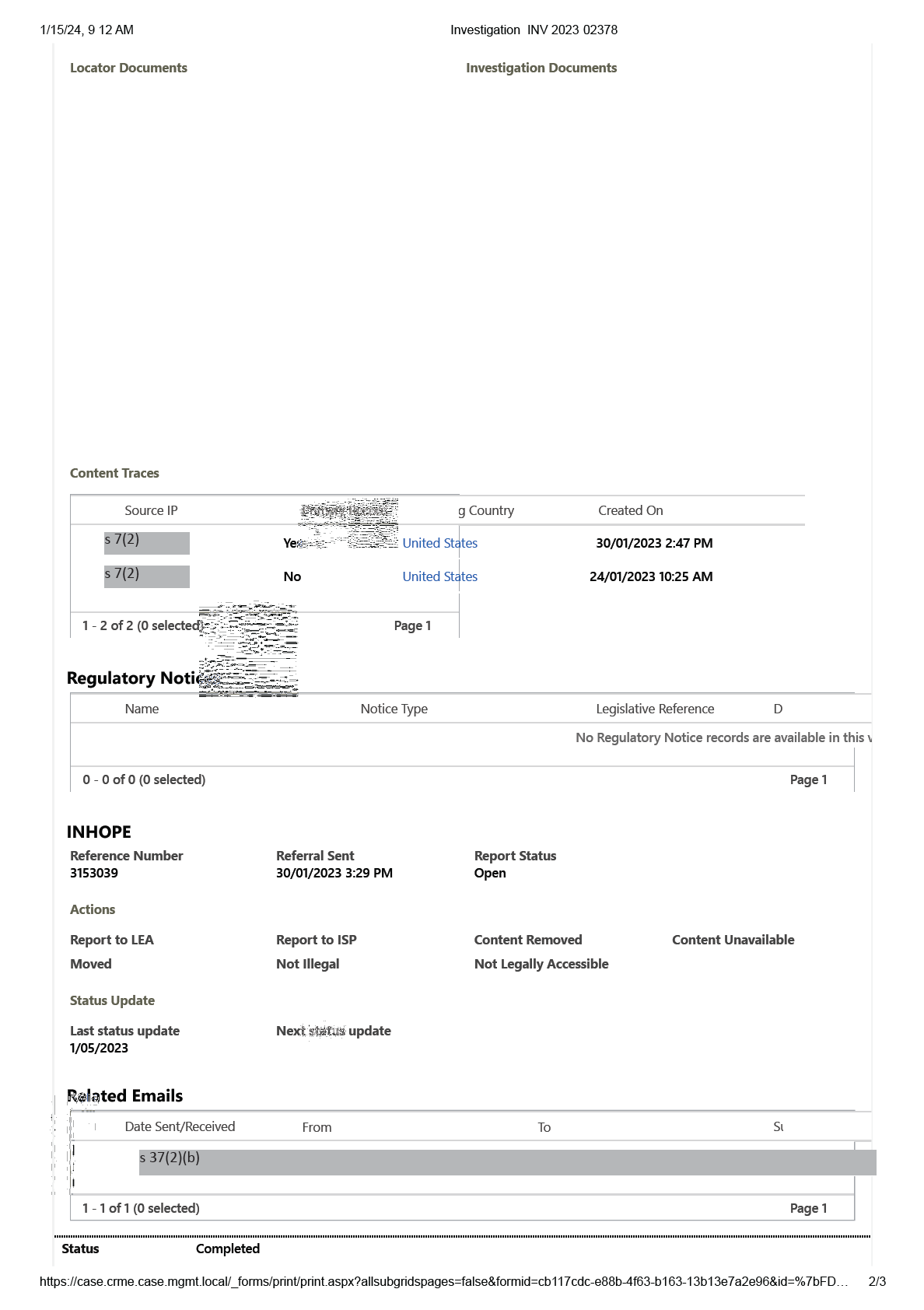
1/15/24, 9 12 AM
Investigation INV 2023 02378
https://case.crme.case.mgmt.local/_forms/print/print.aspx?allsubgridspages=false&formid=cb117cdc-e88b-4f63-b163-13b13e7a2e96&id=%7bFD…
3/3
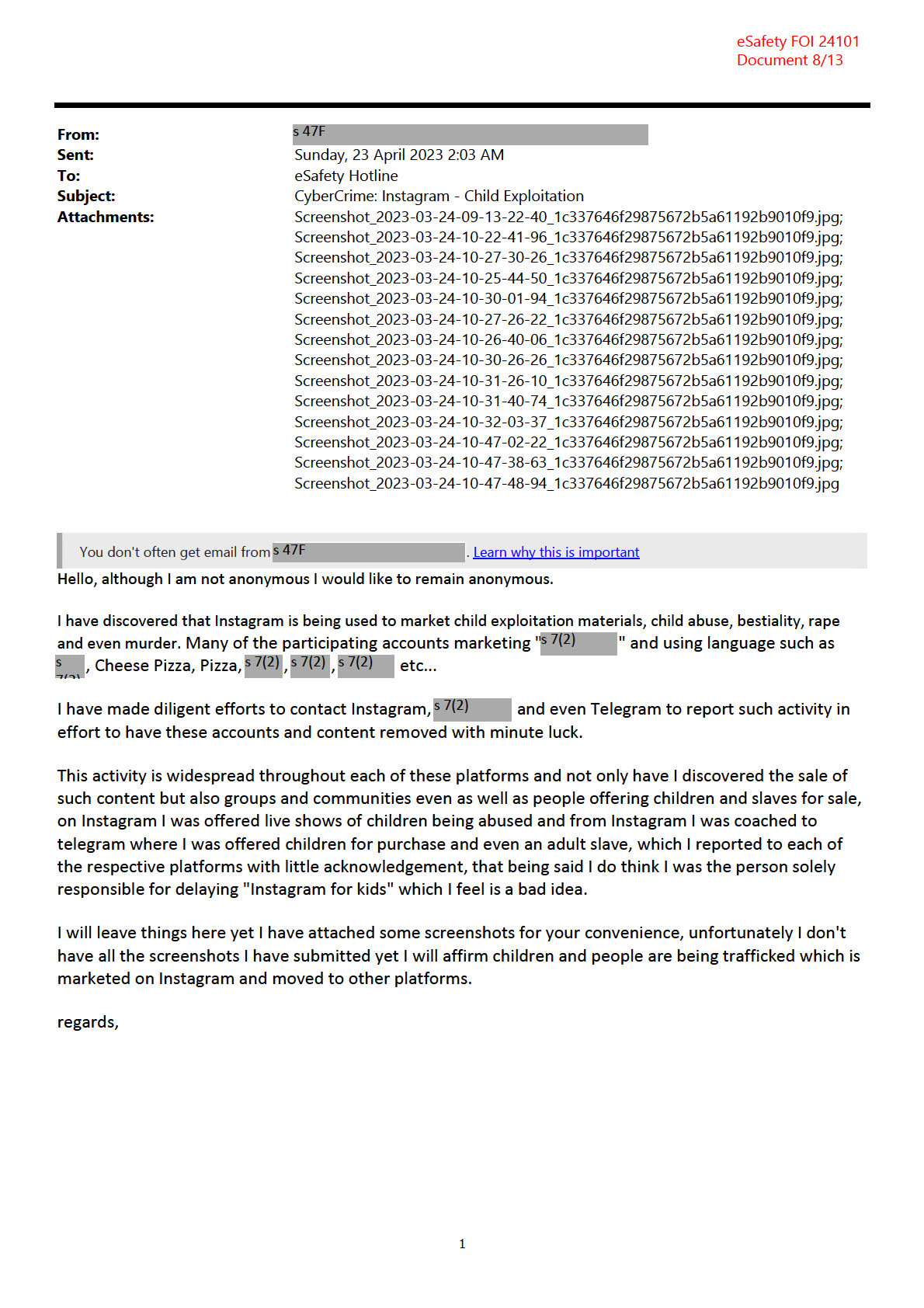
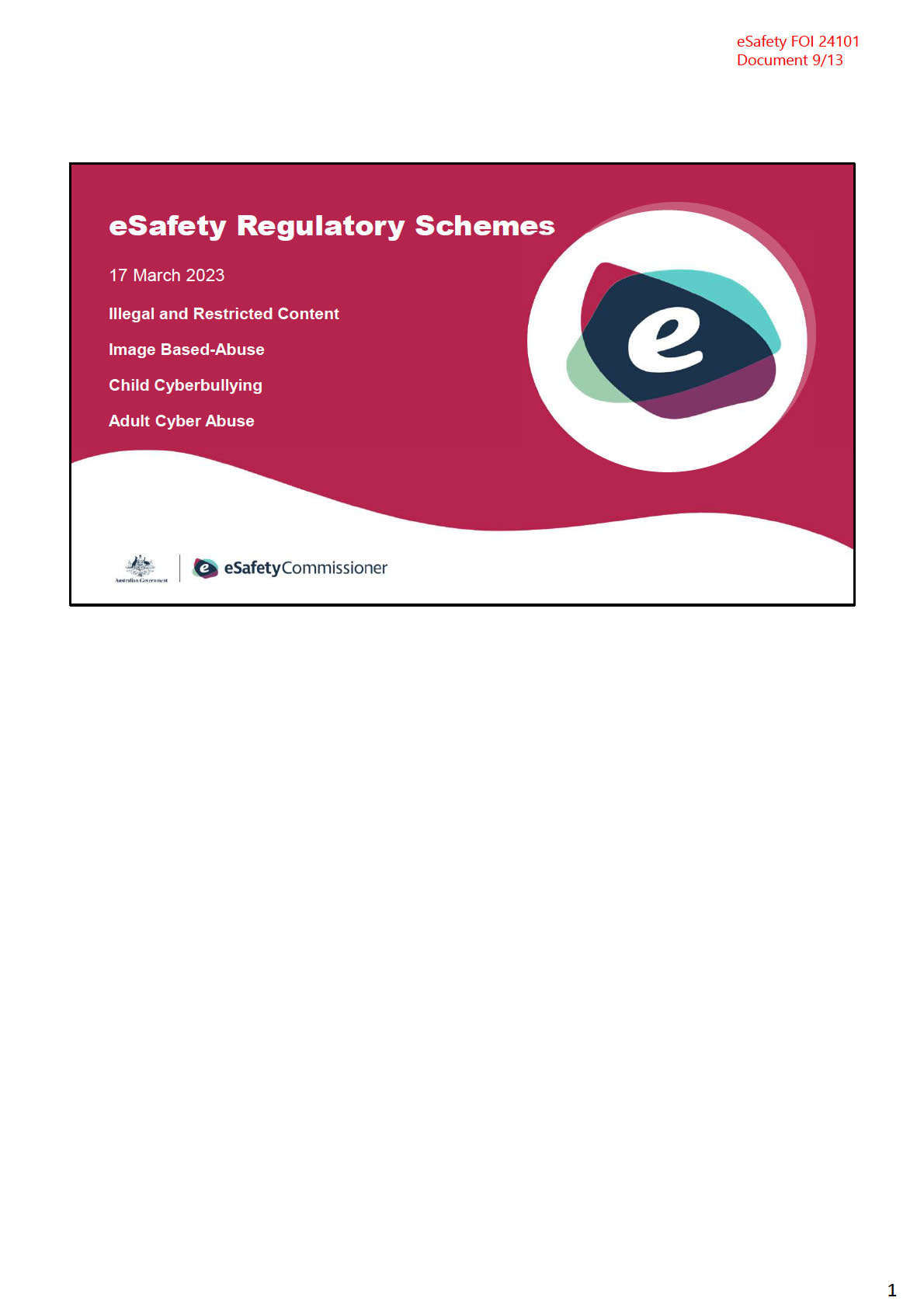
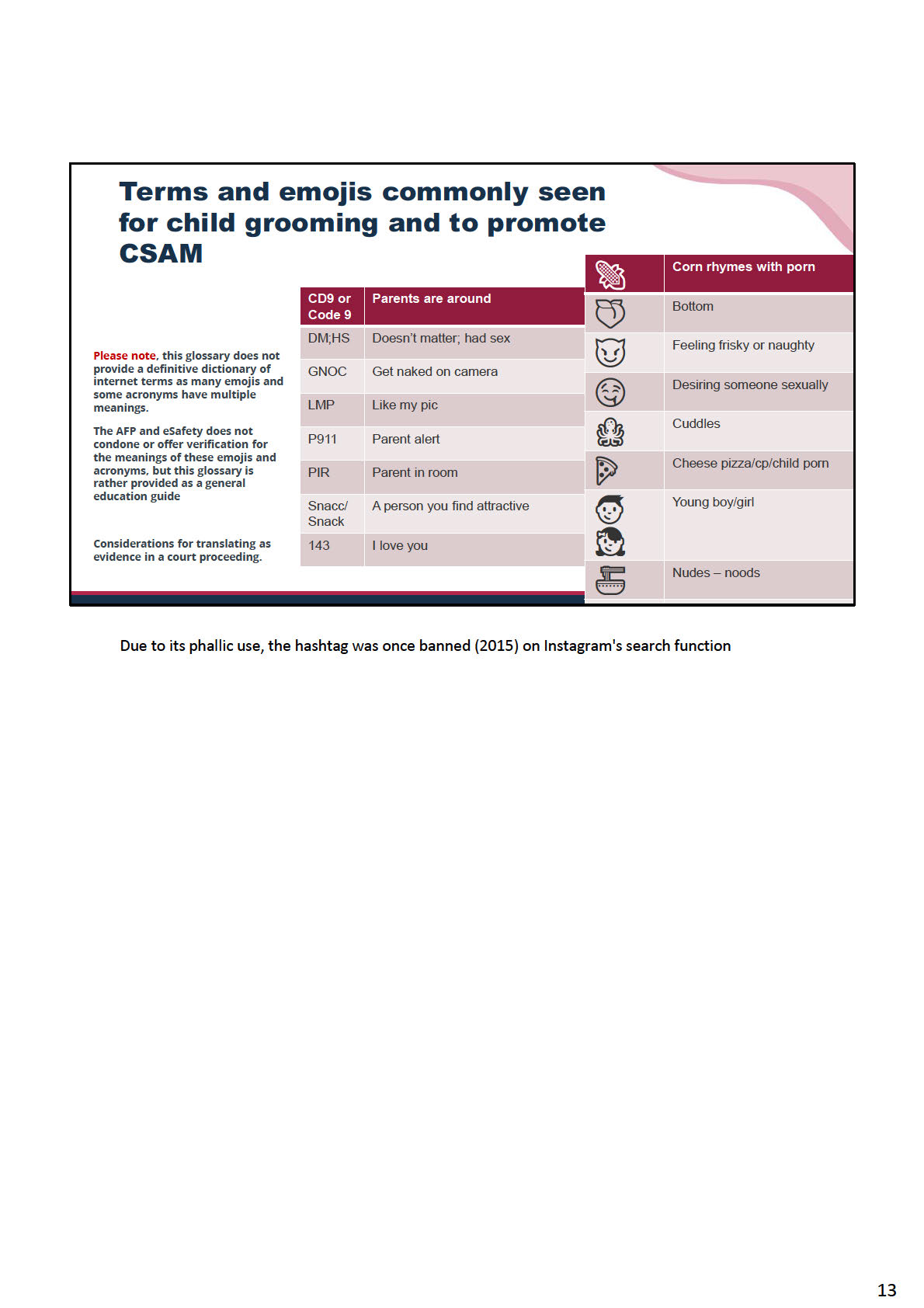
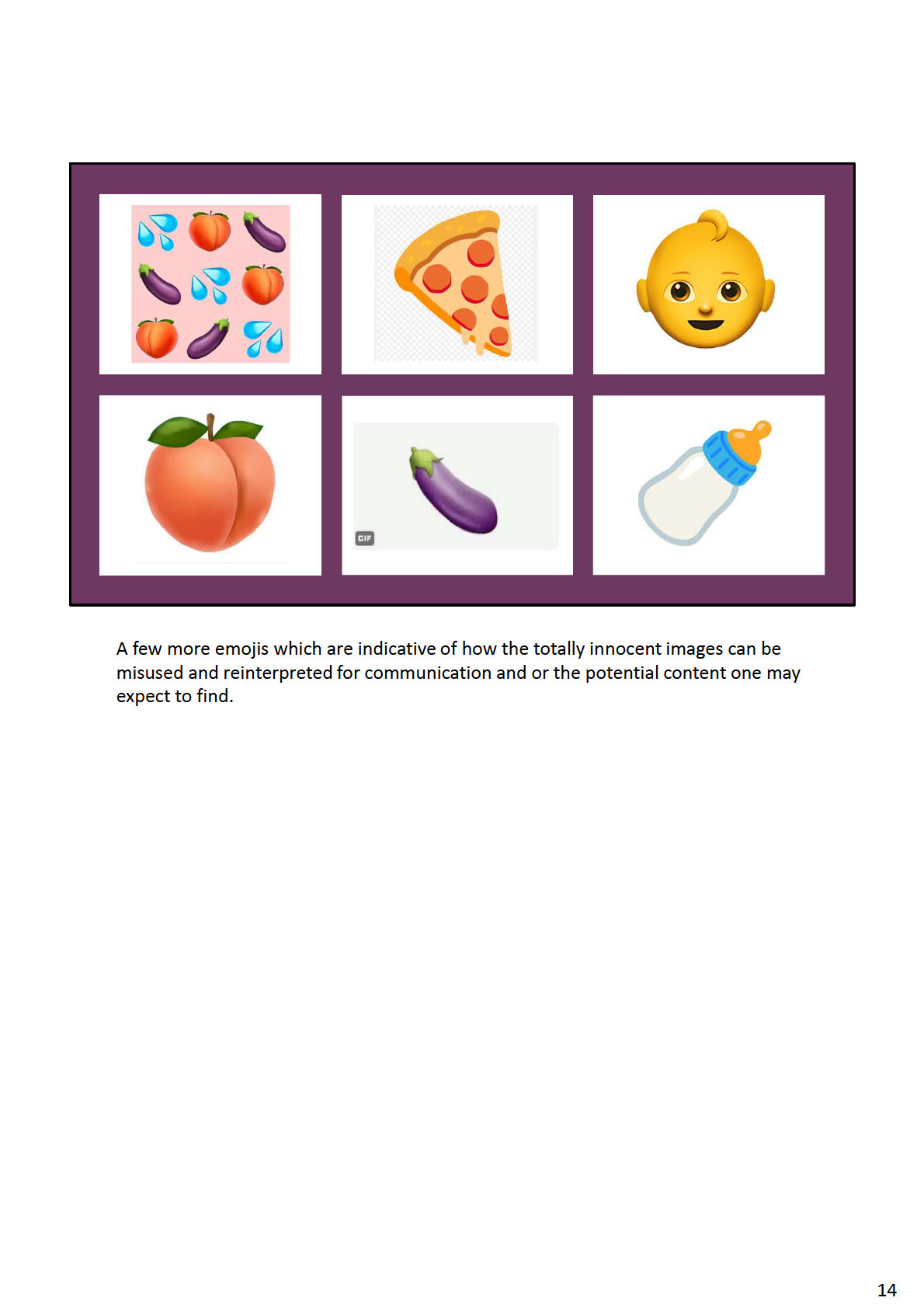


eSafety FOI 24101
Document 13/13
Tech giants including Apple, Google and Meta will be forced to do more to
tackle online child sexual abuse material and pro-terror content, including
“deepfake” child pornography created using generative AI, in world-first
industry standards laid out by Australia’s eSafety Commissioner.
Following more than two years of work, and after rejecting draft codes created
by the tech industry, eSafety Commissioner Julie Inman Grant will release draft
standards on Monday covering cloud-based storage services like Apple iCloud,
Google Drive and Microsoft OneDrive, as well as messaging services like
WhatsApp, requiring them to do more to rid their services of unlawful content.
Inman Grant, a former Twitter executive, said that she hopes Australia’s
industry standards would be the “first domino” of similar regulations globally
to help tackle harmful content.
She said the requirements would not force tech companies to break their own
end-to-end encryption, which is turned on by default on some services,
including WhatsApp.
All major tech platforms have policies that ban child sex abuse material from
their public services, but Inman Grant said they have not done enough to
police their own platforms.
“We understand issues around technical feasibility, and we’re not asking them
to do anything that is technically infeasible.”
“But we’re also saying that you’re not absolved of the moral and legal
responsibility to just turn off the lights or shut the door and pretend this
horrific abuse isn’t happening on your platforms.
“What we’ve found working with WhatsApp, it’s an end-to-end encrypted
service, but they pick up on a range of behavioural signals that they’ve
developed over time, and they can scan non-encrypted parts of the services,
including profile anpd group chat names, and things like cheese pizza emojis,
which is known to stand for child pornography.”
“These and other interventions enable WhatsApp to make 1.3 million reports
of child sexual exploitation and abuse each year,” she added.
The standards will also cover child sexual abuse material and terrorist
propaganda created using open-source software and generative AI. A growing
number of Australian students for example are creating so-called “deepfake
porn” of their classmates and sharing it in classrooms.
“We’re seeing synthetic child sexual abuse material being reported through
our hotlines, and that’s particularly concerning to our colleagues in law
enforcement, because they spend a lot of time doing victim identification so
that they can actually save children who are being abused,” she said.
“I think the regulatory scrutiny has to be at the design phase. If we’re not
building in and testing the efficacy and robustness of these guardrails at the
design phase, once they’re out in the wild, and they’re replicating, then we’re
just playing probably an endless and somewhat hopeless game of whack-a-
mole.”
Inman Grant’s office has commenced public consultation on the draft
standards, a process that will run for 31 days. She said the final versions of the
standards will be tabled in federal parliament and come into effect six months
after they’re registered.
“The standards also require these companies to have sufficient trust and
safety, resourcing and personnel. You can’t do content moderation if you’re
not investing in those personnel, policies, processes and technologies,” she
said.
“And you can’t have your cake and eat it too. And what I mean by that is, if
you’re not scanning for child sexual abuse, but then you provide no way for the
public to report to you when they come across it on your services, then you are
effectively turning a blind eye to live crime scenes happening on your
platform.”
The introduction of the standards comes after social media giant X – formerly
known as Twitter – refused to pay a $610,500 fine from the eSafety
Commissioner for allegedly failing to adequately tackle child exploitation
material on its platform.
X has filed an application for a judicial review in the Federal Court.
“eSafety continues to consider its options in relation to X Corp’s non-
compliance with the reporting notice but cannot comment on legal
proceedings,” a spokesman for the commissioner said.



























